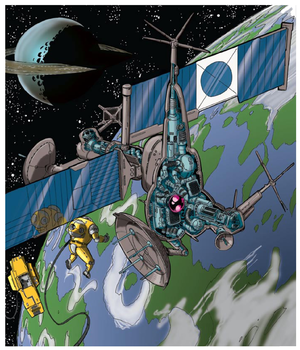Difference between revisions of "Satellite"
m (copyedits) |
m (spellcheck, target, citation/whitespace) |
||
| (4 intermediate revisions by 3 users not shown) | |||
| Line 2: | Line 2: | ||
== Description == | == Description == | ||
| − | '''Satellites''' are small, typically unmanned versions of [[Space Station]]s, placed in orbit around another planetary body.<ref name="TOp148">''Tactical Operations'', p. 148 | + | '''Satellites''' are small, typically unmanned versions of [[Space Station]]s, placed in orbit around another planetary body.<ref name="TOp148">''Tactical Operations'', p. 148: "Satellites"</ref> Their uses can vary tremendously, from providing communications or navigation assistance to battlefield reconnaissance and missile defense. |
| − | Satellites are extremely reliant on accurately | + | Satellites are extremely reliant on accurately plotted orbits and computer controls, as they are only equipped with station-keeping drives, giving them a maximum acceleration of around .025 G.<ref name="TOp148"/> They are typically placed in either a low-altitude or geo-synchronous orbit, although more exotic orbits such as Molnyia orbits are also possible. Low-altitude orbits, typically a few hundred kilometers from the surface, will travel over the same band of terrain, while a geo-synchronous orbit will maintain its location over the same equatorial location at a distance of several thousand kilometers, depending on the planet.<ref name="TOp148"/> Communications satellites tend to be located in geo-synchronous orbits, while weather, science and reconnaissance satellites tend towards low-altitude, especially polar, orbits.<ref name="TOp231+">''Tactical Operations'', pp. 231–233: "Satellites"</ref> |
| − | The uses for satellites are many and varied, depending on their equipment. Many satellites are | + | The uses for satellites are many and varied, depending on their equipment. Many satellites are multirole, especially mass-produced [[Inner Sphere]] models, which can be reconfigured quickly and easily.<ref name="TOp231+"/> Reconnaissance satellites make use of various satellite imagers, such as [[High-Resolution Imager Camera|High-Resolution Imager]]s, [[Infrared Imager Camera|Infrared Imagers]], [[Hyperspectral Imager]]s and [[Look-Down Radar]]. Communications and navigation satellites equipped with high-powered radio beacons allow people equipped with a [[Satellite Uplink]] or [[SatNav Receiver]] to communicate effortlessly or pinpoint their exact location on a planet. If equipped with weaponry, satellites can be used to defend themselves or an important target from missiles and other enemy combatants. |
== History == | == History == | ||
| − | During the golden years of the [[Star League]], many planets were ringed by networks of satellites, providing plenty of benefits both military and civilian. However, during the [[Amaris Civil War]] and subsequent [[Succession Wars (History)|Succession Wars]], many of these satellites were targeted for destruction, and the ability for many planets to rebuild their satellite network was lost.<ref name="LT:TMWEGp101">''LosTech: The MechWarrior Equipment Guide'', p. 101 | + | During the golden years of the [[Star League]], many planets were ringed by networks of satellites, providing plenty of benefits both military and civilian. However, during the [[Amaris Civil War]] and subsequent [[Succession Wars (History)|Succession Wars]], many of these satellites were targeted for destruction, and the ability for many planets to rebuild their satellite network was lost.<ref name="LT:TMWEGp101">''LosTech: The MechWarrior Equipment Guide'', p. 101: "SatNav Receiver"</ref> |
== See Also == | == See Also == | ||
| Line 18: | Line 18: | ||
== Bibliography == | == Bibliography == | ||
| − | * ''[[LosTech: The | + | * ''[[LosTech: The MechWarrior Equipment Guide]]'' |
* ''[[Tactical Operations]]'' | * ''[[Tactical Operations]]'' | ||
| + | |||
[[Category:Technology|Satellite]] | [[Category:Technology|Satellite]] | ||
| − | |||
Latest revision as of 23:26, 10 February 2023
Description[edit]
Satellites are small, typically unmanned versions of Space Stations, placed in orbit around another planetary body.[1] Their uses can vary tremendously, from providing communications or navigation assistance to battlefield reconnaissance and missile defense.
Satellites are extremely reliant on accurately plotted orbits and computer controls, as they are only equipped with station-keeping drives, giving them a maximum acceleration of around .025 G.[1] They are typically placed in either a low-altitude or geo-synchronous orbit, although more exotic orbits such as Molnyia orbits are also possible. Low-altitude orbits, typically a few hundred kilometers from the surface, will travel over the same band of terrain, while a geo-synchronous orbit will maintain its location over the same equatorial location at a distance of several thousand kilometers, depending on the planet.[1] Communications satellites tend to be located in geo-synchronous orbits, while weather, science and reconnaissance satellites tend towards low-altitude, especially polar, orbits.[2]
The uses for satellites are many and varied, depending on their equipment. Many satellites are multirole, especially mass-produced Inner Sphere models, which can be reconfigured quickly and easily.[2] Reconnaissance satellites make use of various satellite imagers, such as High-Resolution Imagers, Infrared Imagers, Hyperspectral Imagers and Look-Down Radar. Communications and navigation satellites equipped with high-powered radio beacons allow people equipped with a Satellite Uplink or SatNav Receiver to communicate effortlessly or pinpoint their exact location on a planet. If equipped with weaponry, satellites can be used to defend themselves or an important target from missiles and other enemy combatants.
History[edit]
During the golden years of the Star League, many planets were ringed by networks of satellites, providing plenty of benefits both military and civilian. However, during the Amaris Civil War and subsequent Succession Wars, many of these satellites were targeted for destruction, and the ability for many planets to rebuild their satellite network was lost.[3]



